【中考夺分天天练】2015届中考英语(全国·人教版)总复习+第一篇 基础巧过关:八年级下册+[Units+5—6](共35张PPT)
文档属性
| 名称 | 【中考夺分天天练】2015届中考英语(全国·人教版)总复习+第一篇 基础巧过关:八年级下册+[Units+5—6](共35张PPT) |
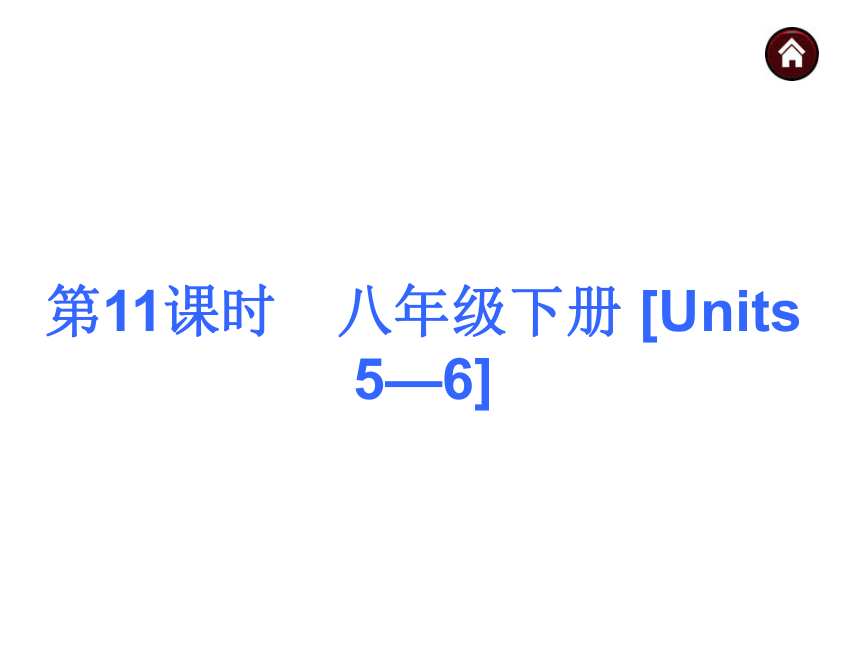
|
|
| 格式 | zip | ||
| 文件大小 | 34.5KB | ||
| 资源类型 | 教案 | ||
| 版本资源 | 人教新目标(Go for it)版 | ||
| 科目 | 英语 | ||
| 更新时间 | 2014-12-12 00:00:00 | ||
图片预览

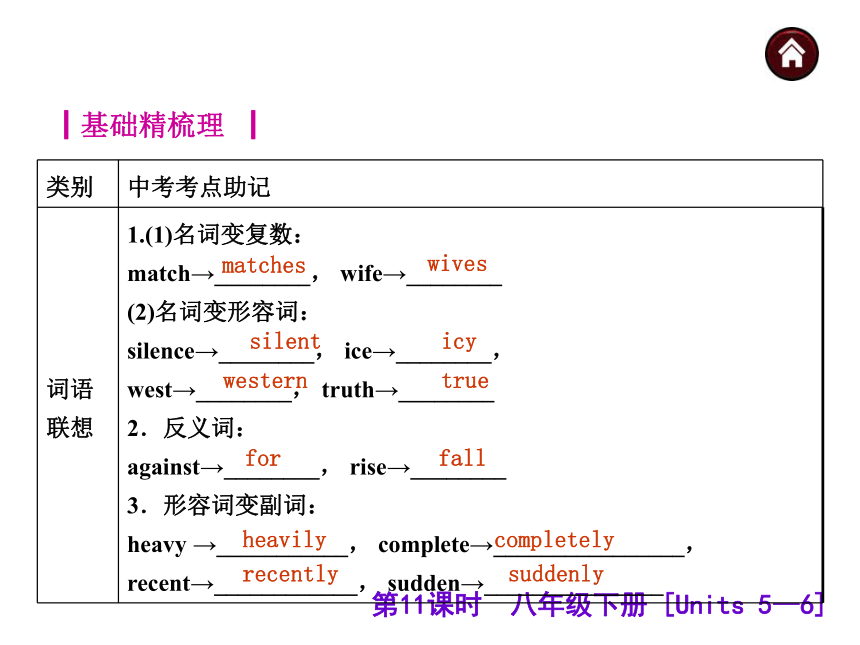
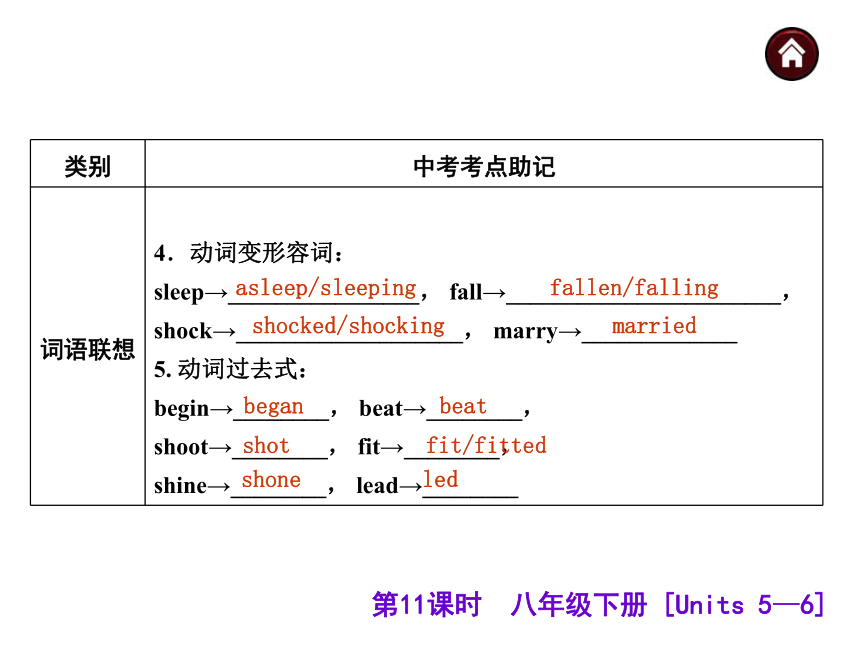
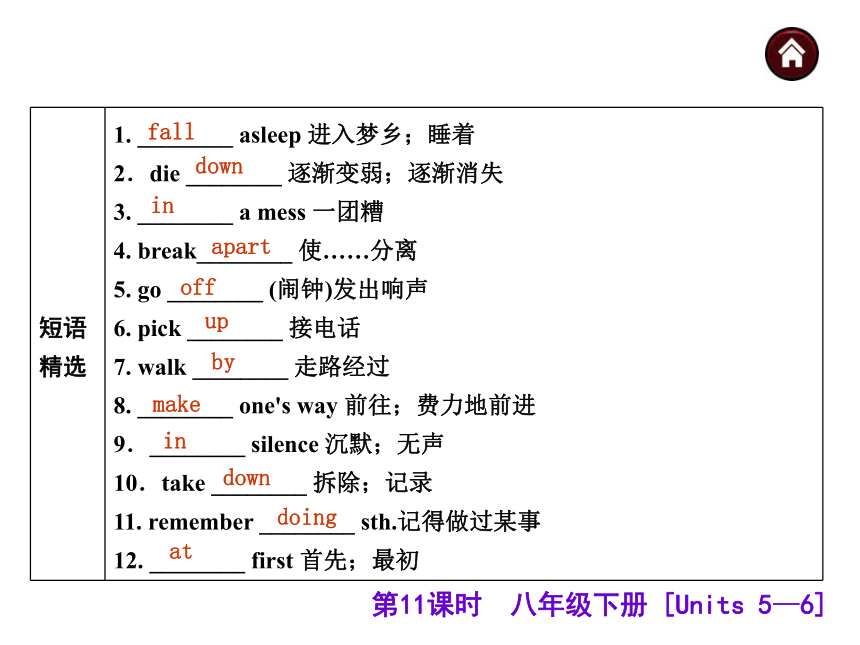
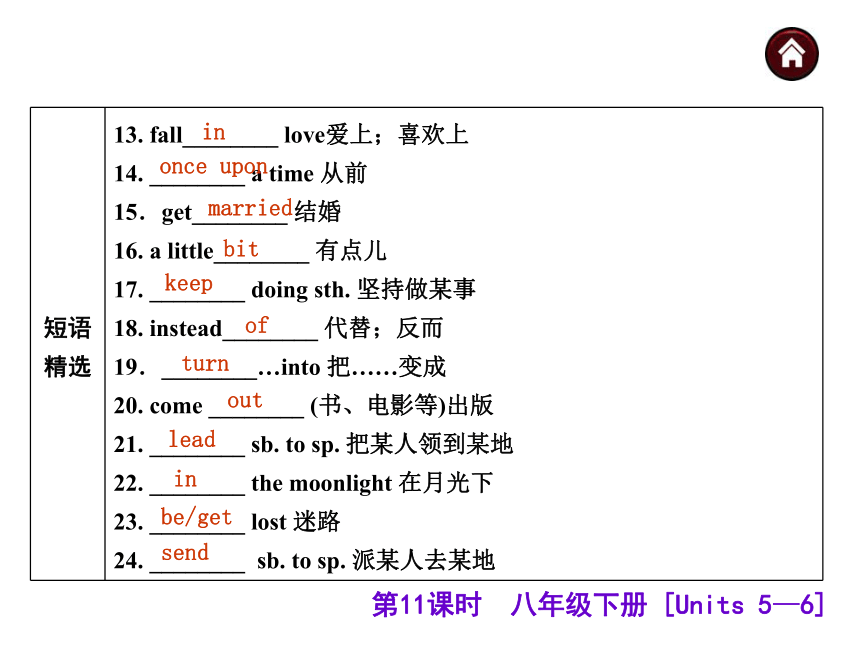
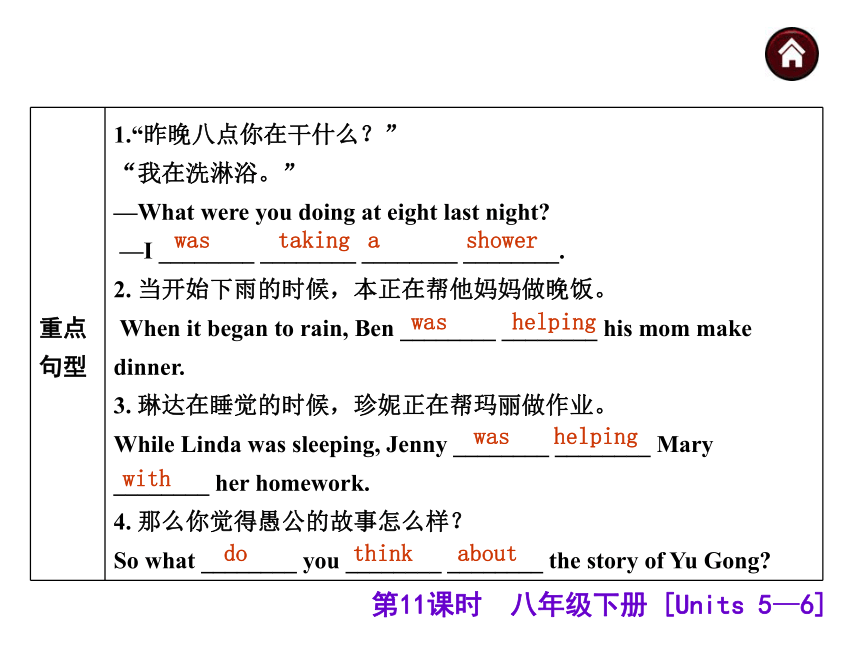
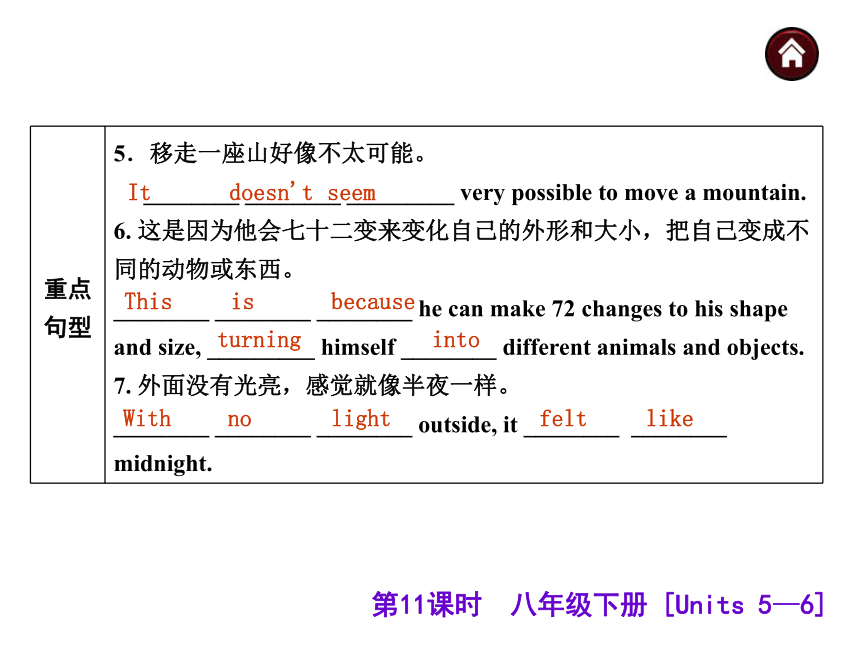
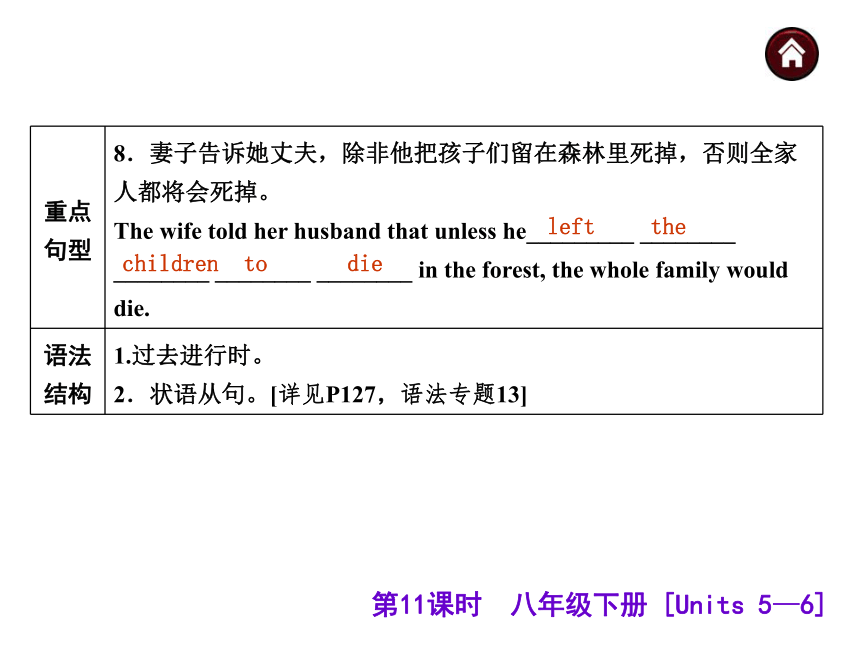
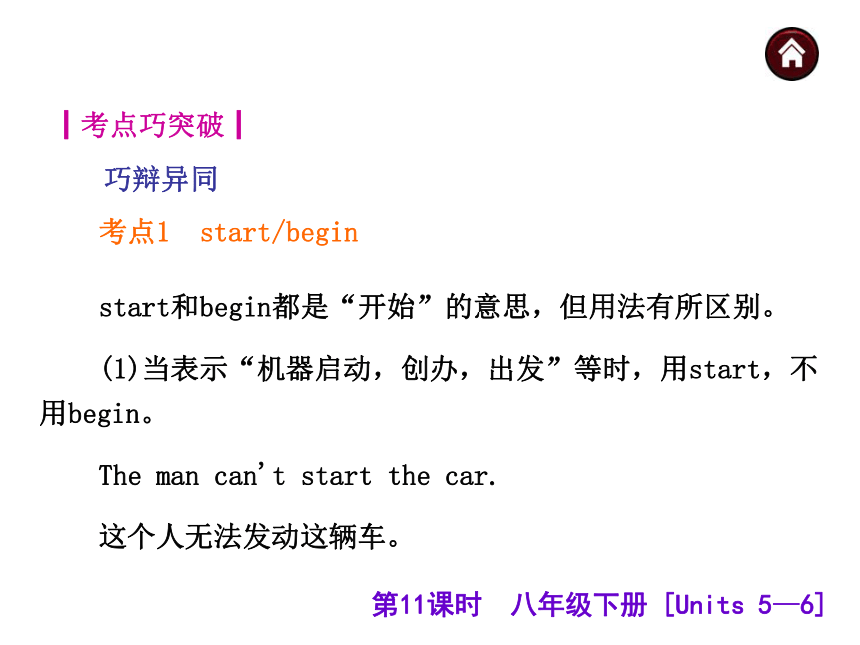
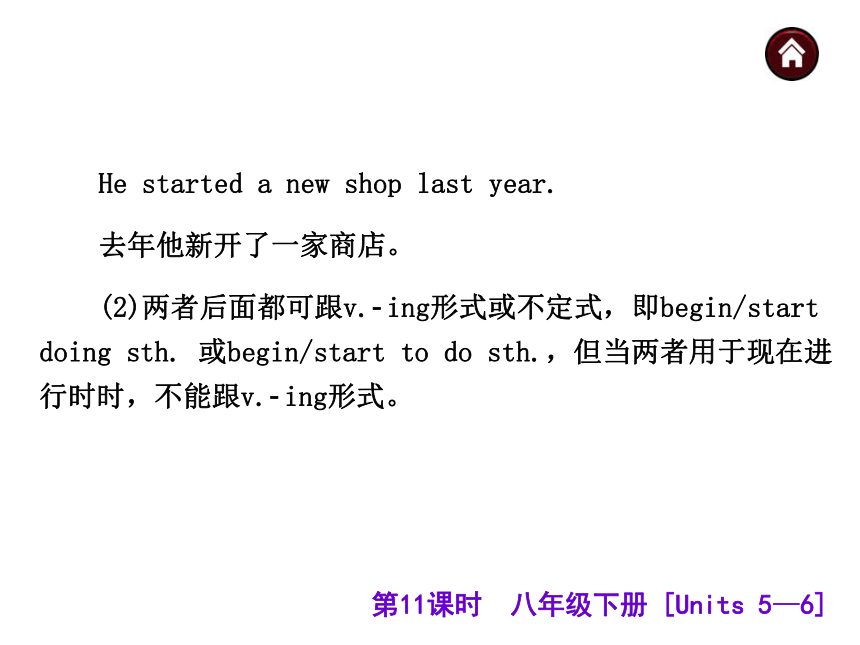
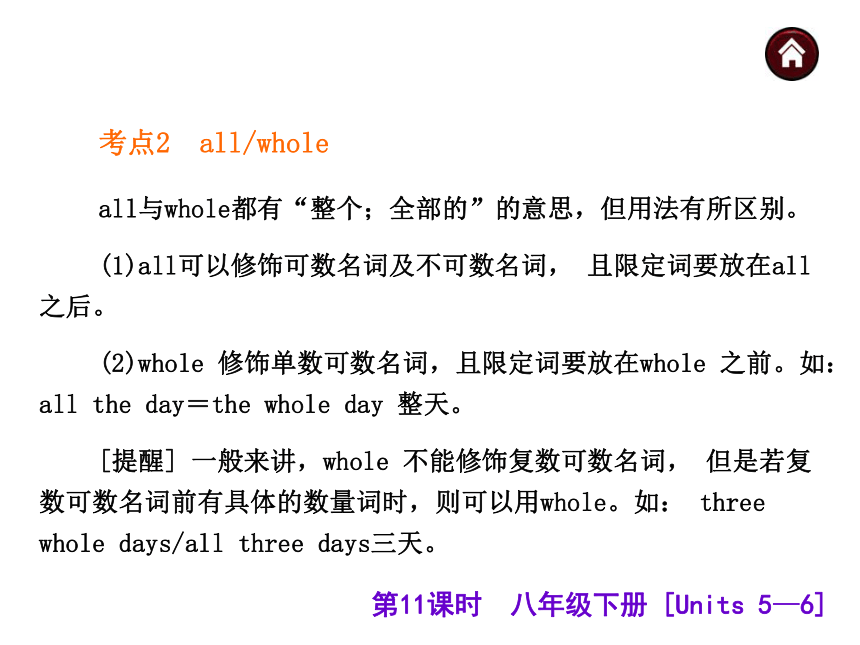
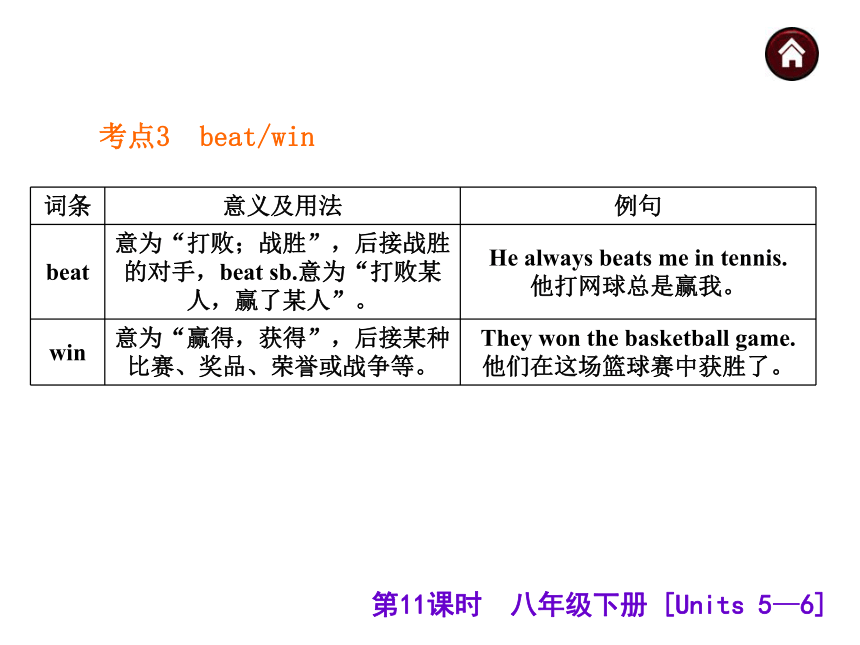
文档简介
课件35张PPT。第11课时 八年级下册 [Units 5—6]第11课时 八年级下册 [Units 5—6]┃基础精梳理 ┃matches wivessilenticywesterntrueforfallheavilycompletelyrecentlysuddenly第11课时 八年级下册 [Units 5—6]asleep/sleepingfallen/fallingshocked/shockingmarriedbeganbeatshotfit/fittedshoneled第11课时 八年级下册 [Units 5—6]falldowninapart off upbymakeindowndoingat第11课时 八年级下册 [Units 5—6]inonce uponmarriedbitkeepofturnoutleadinbe/getsend第11课时 八年级下册 [Units 5—6]was takingashowerwashelpingwashelpingwithdothinkabout第11课时 八年级下册 [Units 5—6]Itdoesn'tseemThisis becauseturning intoWithnolightfelt like第11课时 八年级下册 [Units 5—6]leftthe childrentodie第11课时 八年级下册 [Units 5—6]┃考点巧突破┃考点1 start/begin 巧辩异同start和begin都是“开始”的意思,但用法有所区别。
(1)当表示“机器启动,创办,出发”等时,用start,不用begin。
The man can't start the car.
这个人无法发动这辆车。第11课时 八年级下册 [Units 5—6]He started a new shop last year.
去年他新开了一家商店。
(2)两者后面都可跟v.-ing形式或不定式,即begin/start doing sth. 或begin/start to do sth.,但当两者用于现在进行时时,不能跟v.-ing形式。第11课时 八年级下册 [Units 5—6]考点2 all/whole all与whole都有“整个;全部的”的意思,但用法有所区别。
(1)all可以修饰可数名词及不可数名词, 且限定词要放在all之后。
(2)whole 修饰单数可数名词,且限定词要放在whole 之前。如: all the day=the whole day 整天。
[提醒] 一般来讲,whole 不能修饰复数可数名词, 但是若复数可数名词前有具体的数量词时,则可以用whole。如: three whole days/all three days三天。第11课时 八年级下册 [Units 5—6]考点3 beat/win 第11课时 八年级下册 [Units 5—6]考点4 a bit/a bit of/a little (1) a bit 和 a little 在肯定句中修饰动词、形容词、副词及比较级时,可以互换,表示“一点儿”。
After a day's work, I'm a bit/a little tired.
工作了一天之后,我有点儿累。
[注意] a bit 和 a little 在否定句中,意思正好相反。not a bit=not at all一点也不
not a little=very much/extremely非常第11课时 八年级下册 [Units 5—6]I'm not a bit tired.=I'm not tired at all.
我一点儿也不累。
I'm not a little tired.=I'm very tired.我非常累。
(2)a little 和a bit of可以作定语,修饰名词,两者只能修饰不可数名词。
There's only a little/a bit of food left for lunch.
午餐只剩一点儿食物了。第11课时 八年级下册 [Units 5—6]考点5 go to sleep/be asleep/fall asleep/go to bed (1)go to sleep指“入睡,进入梦乡”,表示动作。
He was so tired that he went to sleep soon.
他很累,很快就睡着了。
(2)be asleep表示“睡着”的状态,只能用sound, fast等词修饰。
The baby is fast asleep. 那个婴儿睡得很香。第11课时 八年级下册 [Units 5—6](3)fall asleep意为“睡着”,表示一个动作的过程,侧重指“自然而然地入睡,不想入睡而入睡”。
I don't know when I fell asleep last night.
我不知道我昨晚什么时候睡着的。
(4)go to bed意为“就寝,上床睡觉”,无“睡着”之意。
One may keep healthy if he/she goes to bed early and gets up early.
如果一个人早睡早起,他/她才可能保持身体健康。 第11课时 八年级下册 [Units 5—6]句型点击考点1 With no light outside, it felt like midnight. 外面没有光亮,感觉就像半夜一样。[点拨] 句中的“with no light outside”是“with+宾语+宾语补足语”结构。此结构常作状语,其中宾语常常是名词,宾语补足语可以是介词短语、形容词、副词、过去分词等。第11课时 八年级下册 [Units 5—6]With some books in his hand, he entered the classroom. 他走进了教室,手里拿着一些书。(介词短语)
Don't sleep with the window open in winter.
冬天不要开着窗户睡觉。(形容词)第11课时 八年级下册 [Units 5—6]考点2 He went outside with his family and found the neighborhood in a mess. 他和家人来到外面,发现社区一片狼藉。[点拨] “find+sb./sth.+宾语补足语”意为“发现某人/某物……”,在此结构中,作宾语补足语的可以是现在分词、副词、名词、介词短语、(to be+)形容词等。
We found a group of children playing on the playground.第11课时 八年级下册 [Units 5—6]我们发现一群孩子正在操场上玩耍。(现在分词)
I found him out last night.
昨晚我发现他出去了。(副词)
You'll find it a good book.
你会发现它是一本好书。(名词)
I found him already in the office.
我发现他已经在办公室了。 (介词短语)第11课时 八年级下册 [Units 5—6]We find him very honest.
我们发现他很诚实。 (形容词)
[提醒] 当find后接形容词作宾语补足语时,可改为“find+that从句”或“find+it+形容词+动词不定式”结构。第11课时 八年级下册 [Units 5—6]考点3 The wife told her husband that unless he left the children to die in the forest, the whole family would die. 妻子告诉她丈夫,除非他把孩子们留在森林里死掉,否则全家人都将会死掉。 [点拨] leave sb. to do sth. 意为“留下某人做某事”。
He went away and left me to do all the rest work.
他走了,留下我做剩下所有的工作。第11课时 八年级下册 [Units 5—6][拓展] (1) leave sb. doing sth. 意为“让某人做某事”。
The teacher left little Tom doing his homework all the time. 老师让小汤姆一直做作业。
(2)“leave+sb./sth.+形容词”意为“让某物或某人处于某种状态”。
His illness left him very weak.
他生病后,身体很虚弱。
第11课时 八年级下册 [Units 5—6]┃智能双提升┃基础过关Ⅰ.根据句意及首字母提示补全单词
1.Let's set out now since the sun has r________.
2.Many people like Wang Fei's songs because she has a sweet v________.
3.It rained so h________ last night that the lake is full of water now.isen oice eavily 第11课时 八年级下册 [Units 5—6]4.If the sun s________ brightly, the weather is usually warm.
5.You are b________ enough to accept such a difficult job.hines rave 第11课时 八年级下册 [Units 5—6]Ⅱ. 根据汉语意思完成句子
1.为了保持健康,越来越多的人宁愿步行去上班,而不愿开车去上班。
To keep healthy, more and more people would go to work on foot_________ ________ by car.
2.我一到那儿就给你打电话。
I'll call you ________ ________ ________I ____________________ there. insteadof assoonasget/arrive/reach 第11课时 八年级下册 [Units 5—6]3.当我们谈论《爸爸去哪儿》这部电影的时候,他对此一无所知。
When we________ ________ ________ the film Where are we going, Dad? he knew nothing about it.
4. 我正在浏览托尼的微博时,他突然打电话给我。
I ________ ________ ________Tony's Micro-blog when suddenly he telephoned me.weretalking aboutwaslookingthrough第11课时 八年级下册 [Units 5—6]5.电影《钢铁侠3》如此激动人心,以至于好评如潮。
The film Iron Man 3 is ________ ________ that it has won lots of good reviews. soexciting第11课时 八年级下册 [Units 5—6]1. [2014·白银] —Daisy, look at your bedroom. What a mess!
—Sorry, I'll ________ right now!
A. put up it B. clean up it
C. put it up D. clean it up中考透视D第11课时 八年级下册 [Units 5—6]考查动词短语。 put up 和 clean up 都是“动词+副词”结构,当宾语是代词时, 代词要放在动词和副词之间,故排除选项A和B。句意:“看看你的卧室, 戴西,太乱了!”“对不起,我马上打扫。” clean up 意为“收拾,打扫”。 第11课时 八年级下册 [Units 5—6]2. [2014·广东] —I didn't see you at the beginning of the party last night.
—I ________ on my biology report at that time.
A. worked B. work
C. was working D. am workingC考查时态。句意:“昨晚在聚会开始时我没有看到你。”“那个时候我在努力完成我的生物报告。”根据语境可知要用过去进行时,故选C。 第11课时 八年级下册 [Units 5—6]3. [2014·徐州] Jim is always so busy ________he has little time for his family.
A. if B. until C. that D. whichC第11课时 八年级下册 [Units 5—6]4. [2014·兰州] She ________ to an English program while her parents________ TV.
A. was listening; is watching
B. listened; were watching
C. was listening; watched
D. was listening; were watchingD第11课时 八年级下册 [Units 5—6]考查过去进行时。while引导从句时,表示主句动作和从句动作同时进行,结合句意和选项,可判断选D。 第11课时 八年级下册 [Units 5—6]5. [2014·盐城] It was raining ________ when my sister and I got to the museum.
A. badly B. softly C. hardly D. heavilyD考查副词的辨析。句意:当我和我姐姐到博物馆的时候,雨正下得很大。badly 意为“坏地, 糟糕地”;softly 意为“柔软地”;hardly 意为“几乎不”; heavily 意为“沉重地,猛烈地”。rain heavily为固定搭配。因此答案为D。
(1)当表示“机器启动,创办,出发”等时,用start,不用begin。
The man can't start the car.
这个人无法发动这辆车。第11课时 八年级下册 [Units 5—6]He started a new shop last year.
去年他新开了一家商店。
(2)两者后面都可跟v.-ing形式或不定式,即begin/start doing sth. 或begin/start to do sth.,但当两者用于现在进行时时,不能跟v.-ing形式。第11课时 八年级下册 [Units 5—6]考点2 all/whole all与whole都有“整个;全部的”的意思,但用法有所区别。
(1)all可以修饰可数名词及不可数名词, 且限定词要放在all之后。
(2)whole 修饰单数可数名词,且限定词要放在whole 之前。如: all the day=the whole day 整天。
[提醒] 一般来讲,whole 不能修饰复数可数名词, 但是若复数可数名词前有具体的数量词时,则可以用whole。如: three whole days/all three days三天。第11课时 八年级下册 [Units 5—6]考点3 beat/win 第11课时 八年级下册 [Units 5—6]考点4 a bit/a bit of/a little (1) a bit 和 a little 在肯定句中修饰动词、形容词、副词及比较级时,可以互换,表示“一点儿”。
After a day's work, I'm a bit/a little tired.
工作了一天之后,我有点儿累。
[注意] a bit 和 a little 在否定句中,意思正好相反。not a bit=not at all一点也不
not a little=very much/extremely非常第11课时 八年级下册 [Units 5—6]I'm not a bit tired.=I'm not tired at all.
我一点儿也不累。
I'm not a little tired.=I'm very tired.我非常累。
(2)a little 和a bit of可以作定语,修饰名词,两者只能修饰不可数名词。
There's only a little/a bit of food left for lunch.
午餐只剩一点儿食物了。第11课时 八年级下册 [Units 5—6]考点5 go to sleep/be asleep/fall asleep/go to bed (1)go to sleep指“入睡,进入梦乡”,表示动作。
He was so tired that he went to sleep soon.
他很累,很快就睡着了。
(2)be asleep表示“睡着”的状态,只能用sound, fast等词修饰。
The baby is fast asleep. 那个婴儿睡得很香。第11课时 八年级下册 [Units 5—6](3)fall asleep意为“睡着”,表示一个动作的过程,侧重指“自然而然地入睡,不想入睡而入睡”。
I don't know when I fell asleep last night.
我不知道我昨晚什么时候睡着的。
(4)go to bed意为“就寝,上床睡觉”,无“睡着”之意。
One may keep healthy if he/she goes to bed early and gets up early.
如果一个人早睡早起,他/她才可能保持身体健康。 第11课时 八年级下册 [Units 5—6]句型点击考点1 With no light outside, it felt like midnight. 外面没有光亮,感觉就像半夜一样。[点拨] 句中的“with no light outside”是“with+宾语+宾语补足语”结构。此结构常作状语,其中宾语常常是名词,宾语补足语可以是介词短语、形容词、副词、过去分词等。第11课时 八年级下册 [Units 5—6]With some books in his hand, he entered the classroom. 他走进了教室,手里拿着一些书。(介词短语)
Don't sleep with the window open in winter.
冬天不要开着窗户睡觉。(形容词)第11课时 八年级下册 [Units 5—6]考点2 He went outside with his family and found the neighborhood in a mess. 他和家人来到外面,发现社区一片狼藉。[点拨] “find+sb./sth.+宾语补足语”意为“发现某人/某物……”,在此结构中,作宾语补足语的可以是现在分词、副词、名词、介词短语、(to be+)形容词等。
We found a group of children playing on the playground.第11课时 八年级下册 [Units 5—6]我们发现一群孩子正在操场上玩耍。(现在分词)
I found him out last night.
昨晚我发现他出去了。(副词)
You'll find it a good book.
你会发现它是一本好书。(名词)
I found him already in the office.
我发现他已经在办公室了。 (介词短语)第11课时 八年级下册 [Units 5—6]We find him very honest.
我们发现他很诚实。 (形容词)
[提醒] 当find后接形容词作宾语补足语时,可改为“find+that从句”或“find+it+形容词+动词不定式”结构。第11课时 八年级下册 [Units 5—6]考点3 The wife told her husband that unless he left the children to die in the forest, the whole family would die. 妻子告诉她丈夫,除非他把孩子们留在森林里死掉,否则全家人都将会死掉。 [点拨] leave sb. to do sth. 意为“留下某人做某事”。
He went away and left me to do all the rest work.
他走了,留下我做剩下所有的工作。第11课时 八年级下册 [Units 5—6][拓展] (1) leave sb. doing sth. 意为“让某人做某事”。
The teacher left little Tom doing his homework all the time. 老师让小汤姆一直做作业。
(2)“leave+sb./sth.+形容词”意为“让某物或某人处于某种状态”。
His illness left him very weak.
他生病后,身体很虚弱。
第11课时 八年级下册 [Units 5—6]┃智能双提升┃基础过关Ⅰ.根据句意及首字母提示补全单词
1.Let's set out now since the sun has r________.
2.Many people like Wang Fei's songs because she has a sweet v________.
3.It rained so h________ last night that the lake is full of water now.isen oice eavily 第11课时 八年级下册 [Units 5—6]4.If the sun s________ brightly, the weather is usually warm.
5.You are b________ enough to accept such a difficult job.hines rave 第11课时 八年级下册 [Units 5—6]Ⅱ. 根据汉语意思完成句子
1.为了保持健康,越来越多的人宁愿步行去上班,而不愿开车去上班。
To keep healthy, more and more people would go to work on foot_________ ________ by car.
2.我一到那儿就给你打电话。
I'll call you ________ ________ ________I ____________________ there. insteadof assoonasget/arrive/reach 第11课时 八年级下册 [Units 5—6]3.当我们谈论《爸爸去哪儿》这部电影的时候,他对此一无所知。
When we________ ________ ________ the film Where are we going, Dad? he knew nothing about it.
4. 我正在浏览托尼的微博时,他突然打电话给我。
I ________ ________ ________Tony's Micro-blog when suddenly he telephoned me.weretalking aboutwaslookingthrough第11课时 八年级下册 [Units 5—6]5.电影《钢铁侠3》如此激动人心,以至于好评如潮。
The film Iron Man 3 is ________ ________ that it has won lots of good reviews. soexciting第11课时 八年级下册 [Units 5—6]1. [2014·白银] —Daisy, look at your bedroom. What a mess!
—Sorry, I'll ________ right now!
A. put up it B. clean up it
C. put it up D. clean it up中考透视D第11课时 八年级下册 [Units 5—6]考查动词短语。 put up 和 clean up 都是“动词+副词”结构,当宾语是代词时, 代词要放在动词和副词之间,故排除选项A和B。句意:“看看你的卧室, 戴西,太乱了!”“对不起,我马上打扫。” clean up 意为“收拾,打扫”。 第11课时 八年级下册 [Units 5—6]2. [2014·广东] —I didn't see you at the beginning of the party last night.
—I ________ on my biology report at that time.
A. worked B. work
C. was working D. am workingC考查时态。句意:“昨晚在聚会开始时我没有看到你。”“那个时候我在努力完成我的生物报告。”根据语境可知要用过去进行时,故选C。 第11课时 八年级下册 [Units 5—6]3. [2014·徐州] Jim is always so busy ________he has little time for his family.
A. if B. until C. that D. whichC第11课时 八年级下册 [Units 5—6]4. [2014·兰州] She ________ to an English program while her parents________ TV.
A. was listening; is watching
B. listened; were watching
C. was listening; watched
D. was listening; were watchingD第11课时 八年级下册 [Units 5—6]考查过去进行时。while引导从句时,表示主句动作和从句动作同时进行,结合句意和选项,可判断选D。 第11课时 八年级下册 [Units 5—6]5. [2014·盐城] It was raining ________ when my sister and I got to the museum.
A. badly B. softly C. hardly D. heavilyD考查副词的辨析。句意:当我和我姐姐到博物馆的时候,雨正下得很大。badly 意为“坏地, 糟糕地”;softly 意为“柔软地”;hardly 意为“几乎不”; heavily 意为“沉重地,猛烈地”。rain heavily为固定搭配。因此答案为D。
